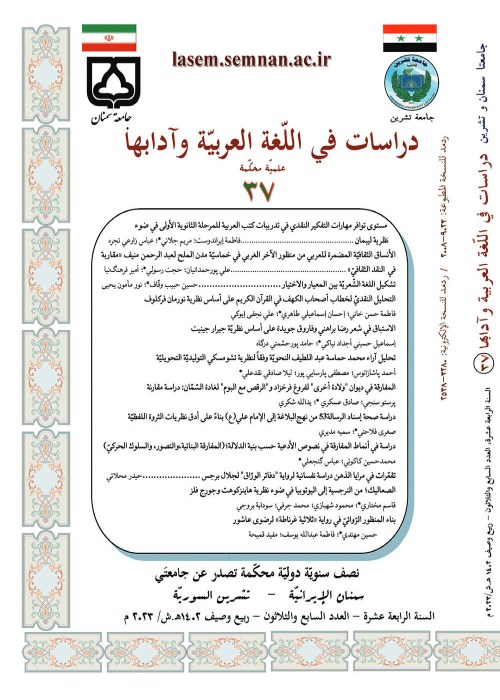Outbreak of knowledge and technology in the novel "The Second War of the Dog” based on Jean-Francois Lyotard's postmodern metanarratives
Author(s):
Article Type:
Research/Original Article (دارای رتبه معتبر)
Abstract:
Lyotard examined the state of knowledge and technology in modern society and questioned them because they serve the rich who do business with them in the capitalist system that created them to acquire wealth. So it affected all aspects of human life and caused his destruction. He rejected extensive meta-narratives and suggested small and temporary sub-narratives. According to the descriptive-analytical method and relying on Lyotard's postmodern components, this article investigates the role of the capitalist system in general and the development of knowledge and technology in particular in the novel. "The Second Dog War" by Ebrahim Nasrallah. One of the research findings of the article is that in the novel "The Second Dog War", knowledge and technology destroy mankind by being in the hands of politicians and using it as a tool, in such a way that the protagonist Rashed by inventing it causes a similarity. The fictional characters brought chaos and ultimately the destruction of mankind as a result. One of the similar theories of Lyotard and Ebrahim Nasrallah is that both of them have pointed to the crises that modern society and the capitalist system and its knowledge and technology have led to as a result of using tools to earn profit. , With the difference that Lyotard completely rejects the project of enlightenment and modern reason and its manifestations, which cannot reject modern society with its manifestations, because modern society with all its shortcomings is largely in providing a better life. Freedom, equality, removal of oppression and racial. discrimination, etc. have been successful But it seems that Nasrallah, without completely rejecting it, proposes the improvement and reform of modern society through the communicative intellect derived from the dialogues of fictional characters and presenting arguments through these characters, although many dialogues in the novel does not refer to democracy and freedom of speech, but it refers to fascism and dictatorship and covert domination to the extent that the dictator's characters took the freedom of speech from the captive characters and humiliated them and allowed them to speak when speaking and asking questions and they don't ask the question.
Keywords:
Language:
Arabic
Published:
Studies on Arabic language and Literature, Volume:13 Issue: 36, 2023
Pages:
25 to 60
magiran.com/p2585751
دانلود و مطالعه متن این مقاله با یکی از روشهای زیر امکان پذیر است:
اشتراک شخصی
با عضویت و پرداخت آنلاین حق اشتراک یکساله به مبلغ 1,390,000ريال میتوانید 70 عنوان مطلب دانلود کنید!
اشتراک سازمانی
به کتابخانه دانشگاه یا محل کار خود پیشنهاد کنید تا اشتراک سازمانی این پایگاه را برای دسترسی نامحدود همه کاربران به متن مطالب تهیه نمایند!
توجه!
- حق عضویت دریافتی صرف حمایت از نشریات عضو و نگهداری، تکمیل و توسعه مگیران میشود.
- پرداخت حق اشتراک و دانلود مقالات اجازه بازنشر آن در سایر رسانههای چاپی و دیجیتال را به کاربر نمیدهد.
In order to view content subscription is required
Personal subscription
Subscribe magiran.com for 70 € euros via PayPal and download 70 articles during a year.
Organization subscription
Please contact us to subscribe your university or library for unlimited access!



